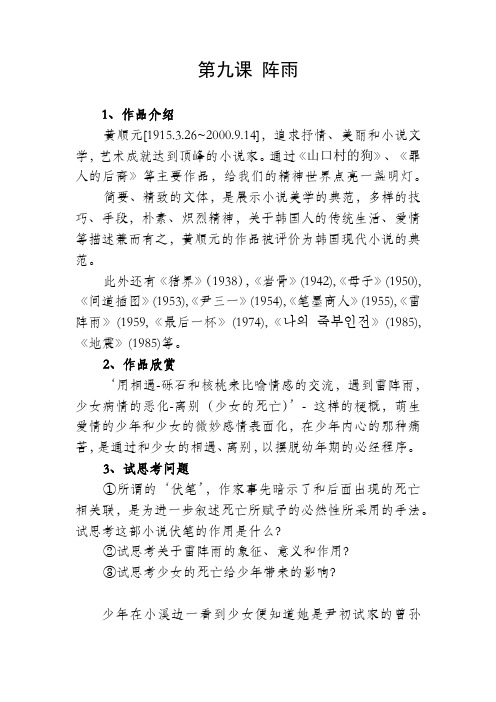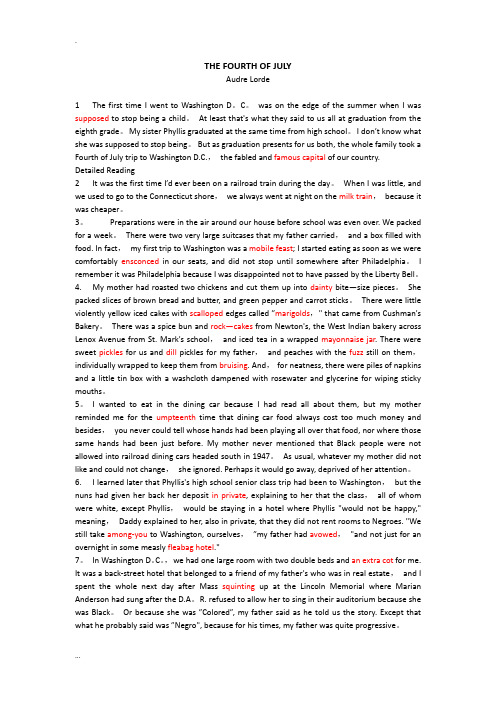韩国语教程5 课文翻译
大学韩国语第五册练习翻译题参考答案

第1课9 (1) 물뿌리기명절(파수절)은태족(중국운남성에거주하는소수민족)의일년경축일중주요경사스러운활동으로문파와무파두종류가있다. 문파는주로존경하는노인이나손님에게나뭇가지나꽃송이로물보라를상대방의몸에뿌리는것이다. 무파는비교적마음대로이다. 세숫대야혹은표주박으로, 물통으로다가능하다. 젊은이들은서로쫓아다니면서정면으로퍼붓고물맞은사람의몸에물기가많을수록축복을더많이받는다는설때문에물을맞는사람도더기뻐한다.(2)预防电脑职业病,平时最好抬头挺胸,下巴稍微往里收。
使用电脑时也一样,如果鼠标放得太远,胳膊抬着的时间过长,胳膊和背部肌肉由于紧张会很酸痛。
所以,鼠标应放在自然拿到的位置。
职员平时用的电脑桌高度要适中,以避免低着头看电脑屏幕。
如果肌肉酸痛,要及时消除疲劳,可以用热毛巾敷脖颈和肩部二、三十分钟。
第2课9 (1) 판다곰은세계적으로가장희귀한동물중의하나이다. 주로우리나라사천, 감숙, 섬서성의높은산악지대에개별적으로분포되어있으며수량이극히적고국가일급보호동물로지정되어있으며“국보”라불린다. 판다곰은세계야생동물협회의협회마크로선정되어있을뿐만아니라때때로“평화의사절”의임무를맡아중국인민의우의를가지고해외에멀리가서이국의벗이되어세계각국사람들의호응을받아왔다. 판다곰은체형이통통하고부드러우며, 머리가둥글고목이짧으며귀가작고꼬리고짧고, 사지가짧고튼튼하다. 몸길이가 1.5미터이고어깨까지는60—70센티미터쯤이되고, 체중은100—180 킬로그램이된다. 특히팔자형으로된한쌍의안구는마치검은색선글라스를쓴것같이귀엽다.(2) 看着克服逆境取得成功的人们的故事,令人想到人到底有没有极限的问题。
任何人在人生的道路上都会遭到这样那样的挫折,只是每个人所面临的困难程度不一样而已。
此时此刻,也许还有许多人在遭受各种各样的苦难,或者苦恼,或者放弃生命。
其中可能有高考落榜的学生,失去工作或财产而倍感失意的人,还可能有遭受事故或病魔折磨的人。
大学韩国语第五册 第三课 健康文化

第三课健康文化一、作品欣赏吃和生计迫在眉睫的时代已经过去,现在已经到了追求“生活品质”的时代。
对吃好和生活好的方法的关注度增加,在全社会健康成为热门话题已经很久了。
观察那个单词的起源,在生活里健康处于怎样的地位是可以说明的吧。
二、思考问题①试思考关于健康文化的优缺点。
②试思考关于可以提高“生活品质”的方法。
③试思考“健康”被歪曲成商业的情况有没有。
美国的电影导演摩根·斯普尔洛克导演某一天看电视新闻,看到一则二个女孩子针对快餐的诉讼新闻,说是快餐成了长体重的原因,所以进行诉讼。
企业针锋相对地说“胖是自身的问题,我们的饮食是有益健康的”。
那时,摩根·斯普尔洛克导演正在吃着快餐,很好奇有没有副作用。
所以,决定自己尝试着证明,一个月内只吃快餐,用记录片的形式记录身体有没有什么变化。
结果导演在一个月之内体重增加了11公斤,胆固醇数值从正常数值169跳到了230。
最终,曾经看上去美好的身姿被毁掉了。
通过那个过程,电影如实地反映了快速食品对我们身体的危害和影响,制造了超大尺码的我。
在韩国,市民团体的活动家尹广龙也挑战韩国版的超大尺码的我,像摩根·斯普尔洛克导演一样,一天吃三顿快餐,参加实验。
可是,开始实验仅过去大约10天,体重增加1公斤、体脂大幅增加3.5公斤,还有,肝的数值超过正常值,上下楼梯开始感到气喘,后来,出现了抑郁症症状。
最终,尹广龙的健康状况恶化,根据医生的警告,没有如预期的满一个月,只有24天实验不得不中止。
中止实验后只有一个月,身体就恢复,体重降下来,体脂经过五个月也没有减少。
由于认识到这种快餐对身体有害的事实,人们开始更关注食品。
比起快餐,吃着喜欢的、对身体有好处的新鲜蔬菜和水果,为了健康有规律地运动的人也渐渐增加了。
健康是什么呀?健康从字面上看,是健康生活的意思,身体和心理都是舒服和美好的,追求幸福的生活,现代人正在用先进文明在污染的社会里生活,对此要反省。
尽量去亲近自然,提高生活的品质。
大学韩国语第五册 第九课 阵雨

第九课阵雨1、作品介绍黄顺元[1915.3.26~2000.9.14],追求抒情、美丽和小说文学,艺术成就达到顶峰的小说家。
通过《山口村的狗》、《罪人的后裔》等主要作品,给我们的精神世界点亮一盏明灯。
简要、精致的文体,是展示小说美学的典范,多样的技巧、手段,朴素、炽烈精神,关于韩国人的传统生活、爱情等描述兼而有之,黄顺元的作品被评价为韩国现代小说的典范。
此外还有《猪界》(1938),《岩骨》(1942),《母子》(1950),《间道插图》(1953),《尹三一》(1954),《笔墨商人》(1955),《雷阵雨》(1959,《最后一杯》(1974),《나의죽부인전》(1985),《地震》(1985)等。
2、作品欣赏‘用相遇-砾石和核桃来比喻情感的交流,遇到雷阵雨,少女病情的恶化-离别(少女的死亡)’- 这样的梗概,萌生爱情的少年和少女的微妙感情表面化,在少年内心的那种痛苦,是通过和少女的相遇、离别,以摆脱幼年期的必经程序。
3、试思考问题①所谓的‘伏笔’,作家事先暗示了和后面出现的死亡相关联,是为进一步叙述死亡所赋予的必然性所采用的手法。
试思考这部小说伏笔的作用是什么?②试思考关于雷阵雨的象征、意义和作用?③试思考少女的死亡给少年带来的影响?少年在小溪边一看到少女便知道她是尹初试家的曾孙女,少女正在把手浸泡在水里玩着水。
似乎在汉城是看不到这样的溪水的。
已经有好几天了,少女在从学校回来的路上这样玩水。
可是,昨天是在小溪岸边玩,而今天却坐在过河迈石中间。
少年坐在小溪岸堤上,等待少女把路让开。
所幸,有人要过河,少女把路让开了。
第二天,来到小溪边晚了一点。
这一天少女正坐在过河迈石中间洗脸。
穿着粉红色的毛衣,捋起袖子,脖颈非常白。
洗了好一会儿,这时往水里盯着看,似乎可以倒映自己的脸,突然,水搅动起来,好像是有鱼经过。
少女不知是否知道少年正坐在溪岸堤上,就那么一直快速地抓水玩,可是,每次都是徒劳的,似乎很有乐趣,总是抓水玩,和昨天一样,直到有人经过小溪才把路让开的样子。
综合教程5课文与课文翻译

THE FOURTH OF JULYAudre Lorde1 The first time I went to Washington D。
C。
was on the edge of the summer when I was supposed to stop being a child。
At least that's what they said to us all at graduation from the eighth grade。
My sister Phyllis graduated at the same time from high school。
I don’t know what she was supposed to stop being。
But as graduation presents for us both, the whole family took a Fourth of July trip to Washington D.C.,the fabled and famous capital of our country.Detailed Reading2 It was the first time I’d ever been on a railroad train during the day。
When I was little, and we used to go to the Connecticut shore,we always went at night on the milk train,because it was cheaper。
3。
Preparations were in the air around our house before school was even over. We packed for a week。
There were two very large suitcases that my father carried,and a box filled with food. In fact,my first trip to Washington was a mobile feast; I started eating as soon as we were comfortably ensconced in our seats, and did not stop until somewhere after Philadelphia。
单词 1大学韩国语 精度5 第二课

촌스럽다 土里土气 사랑스럽다 [形] 可爱。 자랑스럽다 值得骄傲的,引以自豪的 요괴스럽다 妖里妖气的
五脏六腑 五脏:心 肝 肺 脾 肾 오장:심장 간장 폐장 비장 신장 六腑:胃 胆 三焦 膀胱 大肠 육부: 위 쓸개 삼초(三焦) 방광 대장 小肠 소장을 가리킴
망명자 【解释】流亡者或亡命之徒。 컬럼비아 【解释라엘 【解释】以色列。是一个位于西亚 黎凡特地区的国家,位于地中海的东南方向 ,北靠黎巴嫩、东濒叙利亚和约旦、西南边 则是埃及。以色列在1948年宣布独立建国 ,目前人口超过700万,主要来自犹太人族 群,也是世界上唯一以犹太人为主体的国家 。 예루살렘 【解释】耶路撒冷。是以色列的首 都,是伊斯兰教、基督教、犹太教的圣城。
1
단어 보충지식
2
3
연습문제
팔레스타인 [解释]巴勒斯坦,首都马为拉,位于 亚洲西边,地中海南部地区,1948年和以色列一起 从约旦分裂出来。 언저리 【解释】边,周边。 (实)可以引申为眼周,嘴边,湖边等。 (虚)也可表示年龄或时间的的前后,或者程度 或顺序上下。 호수 언저리. 湖边 입 언저리. 嘴边 통합 【解释】合,合并,合起来。 기업 통합. 企业合并 기구를 통합하다 机构合并 아랍 【解释】阿拉伯。 (Arab (영)) 地名。阿拉伯 世界西起大西洋东至阿拉伯海,北起 地中海南至非 洲中部。
조롱【解释】嘲弄,瞧不起。 조롱을 당하다.受人嘲弄。 자서전【解释】自传。 회고하다【解释】回头看;回首(往事)。 과거를 회고하다 回顾过去 삐걱거리다【解释】一个劲嘎吱嘎吱响。 새 구두가 삐걱거리는 소리. 新皮鞋一个劲发出嘎吱嘎吱的声音 。 고집스럽다【解释】固执,执着。 성격이 고집스럽다. 性情执拗
우유 부단하다 【解释】优柔寡断。 우유 부단한 태도 优柔寡断态度 의지박약하다 【解释】意志薄弱。 의지가 박약한 남자 意志软弱的男子 쓸개 【解释】胆囊苦胆。 쓸개 주머니 胆囊 짝지워지다 【解释】成双成对。 총아 【解释】宠儿。 시대의 총아 时代的宠儿 하늘의 총아 天之骄子
新世纪韩国语精读教程高级上课件

3
培养自主学习和合作学习能力,提高综合素质。
பைடு நூலகம்
课程大纲
01
韩国语高级语法
深入学习韩国语高级语法知识,包 括复杂句型、敬语表达等。
韩国文化与社会
了解韩国文化、历史和社会背景, 增强跨文化交流能力。
03
02
韩国语写作
通过写作练习,提高学生的书面表 达能力。
商务韩国语
学习商务场合的韩国语表达和沟通 技巧。
04
韩国语精读教程高级练习 与巩固
词汇与语法练习
词汇练习
通过词汇选择、填空、造句等方式,加 强学生对高级词汇的掌握和运用能力。
VS
语法练习
通过句型转换、时态填空、长句分析等方 式,帮助学生深入理解并正确运用高级语 法。
课文翻译与模仿练习
课文翻译
将课文内容翻译成中文,帮助学生理解文章 含义,同时提高学生的翻译能力。
该系列教材内容全面,注重实际运用,适合高级学习者使用。
韩国语学习网站
02
如Naver、Daum等韩国门户网站,提供丰富的韩国语学习资源
和实时新闻。
韩国语原声电影、电视剧
03
通过观看原声影视作品,提高听力和口语表达能力。
学习计划制定指导
设定学习目标
根据个人学习需求和时间安排,设定明确的学习目标,如 通过韩语高级考试、进行商务韩语交流等。
课文中的长句、难句解析
长句解析
针对课文中的长句,需要拆分句子结 构,理清句子成分之间的关系,理解 其含义。
难句解析
对于课文中的难句,需要结合语境和 上下文理解其含义,掌握其用法。
高级韩国语表达方式解析
高级词汇
本课涉及一些较为高级的词汇,需要理解其含义及用法,并学会在合适的语境中使用。
综合教程5课文与课文翻译
THE FOURTH OF JULYAudre Lorde1 The first time I went to Washington D.C. was on the edge of the summer when I was supposed to stop being a child. At least that's what they said to us all at graduation from the eighth grade. My sister Phyllis graduated at the same time from high school. I don’t know what she was supposed to stop being. But as graduation presents for us both, the whole family took a Fourth of July trip to Washington D.C., the fabled and famous capital of our country.Detailed Reading2 It was the first time I'd ever been on a railroad train during the day. When I was little, and we used to go to the Connecticut shore, we always went at night on the milk train, because it was cheaper.3. Preparations were in the air around our house before school was even over. We packed for a week. There were two very large suitcases that my father carried, and a box filled with food. In fact, my first trip to Washington was a mobile feast; I started eating as soon as we were comfortably ensconced in our seats, and did not stop until somewhere after Philadelphia. I remember it was Philadelphia because I was disappointed not to have passed by the Liberty Bell.4. My mother had roasted two chickens and cut them up into dainty bite-size pieces. She packed slices of brown bread and butter, and green pepper and carrot sticks. There were little violently yellow iced cakes with scalloped edges called "marigolds," that came from Cushman's Bakery. There was a spice bun and rock-cakes from Newton's, the West Indian bakery across Lenox Avenue from St. Mark's school, and iced tea in a wrapped mayonnaise jar. There were sweet pickles for us and dill pickles for my father, and peaches with the fuzz still on them, individually wrapped to keep them from bruising. And, for neatness, there were piles of napkins and a little tin box with a washcloth dampened with rosewater and glycerine for wiping sticky mouths.5. I wanted to eat in the dining car because I had read all about them, but my mother reminded me for the umpteenth time that dining car food always cost too much money and besides, you never could tell whose hands had been playing all over that food, nor where those same hands had been just before. My mother never mentioned that Black people were not allowed into railroad dining cars headed south in 1947. As usual, whatever my mother did not like and could not change, she ignored. Perhaps it would go away, deprived of her attention.6. I learned later that Phyllis's high school senior class trip had been to Washington, but the nuns had given her back her deposit in private, explaining to her that the class, all of whom were white, except Phyllis, would be staying in a hotel where Phyllis "would not be happy," meaning, Daddy explained to her, also in private, that they did not rent rooms to Negroes. "We still take among-you to Washington, ourselves, "my father had avowed, "and not just for an overnight in some measly fleabag hotel."7. In Washington D.C., we had one large room with two double beds and an extra cot for me. It was a back-street hotel that belonged to a friend of my father's who was in real estate, and I spent the whole next day after Mass squinting up at the Lincoln Memorial where Marian Anderson had sung after the D.A.R. refused to allow her to sing in their auditorium because she was Black. Or because she was "Colored", my father said as he told us the story. Except that what he probably said was "Negro", because for his times, my father was quite progressive.8. I was squinting because I was in that silent agony that characterized all of my childhood summers, from the time school let out in June to the end of July, brought about by my dilated and vulnerable eyes exposed to the summer brightness.9. I viewed Julys through an agonizing corolla of dazzling whiteness and I always hated the Fourth of July, even before I came to realize the travesty such a celebration was for Black people in this country.10. My parents did not approve of sunglasses, nor of their expense.11. I spent the afternoon squinting up at monuments to freedom and past presidencies and democracy, and wondering why the light and heat were both so much stronger in Washington D.C., than back home in New York City. Even the pavement on the streets was a shade lighter in color than back home.12. Late that Washington afternoon my family and I walked back down Pennsylvania Avenue. We were a proper caravan, mother bright and father brown, the three of us girls step-standards in-between. Moved by our historical surroundings and the heat of early evening, my father decreed yet another treat. He had a great sense of history, a flair for the quietly dramatic and the sense of specialness of an occasion and a trip.13. "Shall we stop and have a little something to cool off, Lin? "14. Two blocks away from our hotel, the family stopped for a dish of vanilla ice cream at a Breyer's ice cream and soda fountain. Indoors, the soda fountain was dim and fan-cooled, deliciously relieving to my scorched eyes.15. Corded and crisp and pinafored, the five of us seated ourselves one by one at the counter. There was I between my mother and father, and my two sisters on the other side of my mother. We settled ourselves along the white mottled marble counter, and when the waitress spoke at first no one understood what she was saying, and so the five of us just sat there.16. The waitress moved along the line of us closer to my father and spoke again. "I said I kin give you to take out, but you can't eat here, sorry." Then she dropped her eyes looking very embarrassed, and suddenly we heard what it was she was saying all at the same time, loud and clear.17. Straight-backed and indignant, one by one, my family and I got down from the counter stools and turned around and marched out of the store, quiet and outraged, as if we had never been Black before. No one would answer my emphatic questions with anything other than a guilty silence. "But we hadn't done anything!" This wasn't right or fair! Hadn't I written poems about freedom and democracy for all?18. My parents wouldn't speak of this injustice, not because they had contributed to it, but because they felt they should have anticipated it and avoided it. This made me even angrier. My fury was not going to be acknowledged by a like fury. Even my two sisters copied my parents' pretense that nothing unusual and anti-American had occurred. I was left to write my angry letter to the president of the United States all by myself, although my father did promise I could type it out on the office typewriter next week, after I showed it to him in my copybook diary.19. The waitress was white, and the counter was white, and the ice cream I never ate in Washington D.C., that summer I left childhood was white, and the white heat and the white pavement and the white stone monuments of my first Washington summer made me sick to my stomach for the whole rest of that trip and it wasn't much of a graduation present after all.我第一次去华盛顿是在那年刚入夏,这个夏天也是我从此告别孩提时代的开始。
标准韩国语课文翻译
标准韩国语课文翻译第一册第13课问候(自我介绍)一、课文(1)王丹:你好,我是王丹。
李世民:你好,我是李世民。
王丹:李世民,你是韩国人吗?李世民:是的。
我是韩国人。
王丹,你是中国人吧?王丹:是的,我是中国人。
(2)陈文殊:你好啊,徐晶喜。
徐晶喜:你好,陈文殊。
你是学生吗?陈文殊:是的,我是北京大学的学生。
徐晶喜:我是汉城大学的学生。
主修韩国史。
(3)金永浩:你好,我是金永浩。
王龙:你好,我是王龙。
很高兴见到你。
金永浩:很高兴见到你。
王龙:金永浩是学生吗?金永浩:不是。
我在公司上班的。
王龙你是学生吧?王龙:是的,我是大学生。
第14课学校一、课文(1)洪丹:你好,王丹。
王丹:你好,洪丹。
去哪里啊?洪丹:去学校。
王丹:这样啊,我们一起去吧。
(2)金永浩:陈文殊,最近忙什么呢?陈文殊:在学韩国语呢。
金永浩:在哪里学习韩国语啊?陈文殊:在汉城大学语言研究所学习韩国语呢。
(3)请朗读。
请写。
认真听。
请跟着做。
请提问。
请回答。
请看黑板。
知道了吗?有问题吗?第15课叙述过去一.课文(1)李世民:王龙,昨天忙什么呐?王龙:在家里看书。
李世民,你(昨天)忙什么?李世民:我(昨天)见朋友去了。
王龙:见谁?李世民:见朴民秀。
王龙:和朴民秀一起都忙些什么?李世民:看电影,还有聊天。
(2)金志永:洪丹,昨天去景福宫和博物馆了吗?洪丹:去景福宫了,但没去博物馆。
金志永:为什么没去博物馆?洪丹:没时间。
金志永,你都忙什么了?金志永:我在家里打扫卫生,还有,稍微休息了下。
第16课买东西一.课文(1)店主:欢迎光临。
顾客:(给我)面包和牛奶。
店主:好的。
顾客:2个面包,1瓶牛奶。
店主:给你(拿好)。
顾客:多少(钱)?店主:950元。
(2)顾客:大叔,这种苹果多少(钱)?店主:500元。
顾客:那种苹果多少(钱)?店主:那种800元。
顾客:那种苹果我买5个。
店主:共4000元。
顾客:给你钱。
店主:再见(请慢走)。
欢迎再惠。
顾客:再见(请留步)。
大学韩国语第五册 第五课 树木里的熊金先生
第五课树木里的熊金先生1、作品欣赏在和睦的森林里的村庄,所有的动物平等、融洽地相处着,后来有一天一只身材魁梧的熊搬到这里,寻找自己的事情,努力做事情,熊对面临危险的兔子给予帮助后,得到了村里朋友们的尊敬。
但是,渐渐变懒的熊因为有力量,总是以老大自居,逐渐失去了信任。
后来在偶然地与搬来的老虎相遇中,认识到了自己的错误。
2、思考的问题①试思考在水平结构中,垂直结构变化的理由。
②试思考关于尊重自己和得到尊重之间的差异。
.③试思考熊溶解王冠制作戒指的理由是什么?关于戒指的意义?④试思考理想社会的模样,为了实现那个要采取什么行动?在幽深的山中善良的动物们聚集在一起,生活在一个村庄。
兔子、松鼠、山羊、貉、獐、狐狸、田鼠……。
左右之间小的、美丽的动物大大小小地聚集在一起,有滋有味地生活在村庄。
早晨天一亮,动物们从睡梦中醒来,心情很好,来到各自耕种的小小的地里努力地干活。
兔子开垦白菜地,为了让白菜好吃、茁壮成长,每天都来照顾;獐子为了让红色草莓结出硕果费尽心思;连最小的松鼠也努力地收集橡栗和栗子,忙碌地摇动身体。
然后到了吃午饭的时间,动物们坐在村子中间的一个大树下的草地上,分享着各自用饭盒带来的美味。
“狐狸啊,这个西红柿非常甜和凉爽啊。
”“兔子啊,白菜真的很好吃啊。
”动物们友爱地吃完美味的食物,再次回到工作岗位直到太阳落山,一直在自己的田地里努力地耕耘。
日落后,动物们虽然疲惫不堪,但是有成效的一天,清理后去河边洗去汗水,然后貉点燃篝火,聚集在周边,用篝火烤野猪挖来的地瓜,野猪怀着喜悦的心情,和大家一起分享着吃。
心情愉悦的狐狸吹着笛子,松鼠和田鼠挽着胳膊,绕着圈跳着舞,开心地笑着、玩着,然后一个个回到自己的家,为了明天要好好睡觉。
点燃篝火是貉的事,让篝火安全的熄灭也是貉的事。
貉在所有动物都回自己家后,在渐弱的篝火上撒一泡尿让它熄灭,这件事是绝对不会忘记的。
在山里面注意防火是非常重要的事情。
后来某一天早上,一头新的家庭成员搬到森林里。
「标准韩国语课文翻译」
标准韩国语(1)课文翻译第13课1.你好? 我是王丹。
你好?我是李世民。
李世民先生是韩国人吗?是的,韩国人。
王丹是中国人吗?是的,我是中国人。
2.你好?许正姬你好?陈文洙。
陈文洙先生是学生吗?我是汉城大学学生。
专业是韩国历史。
3.你好? 我是金永浩你好? 我是王龙,很高兴见到你。
金永浩先生是学生吗?不是。
我在公司上班。
王龙先生是学生吗?是的,我是大学生。
ﻫ第14课1.你好,王丹你好,洪丹。
去哪里?去学校。
那么和我一起去吧2.陈文洙先生,最近忙什么?学习韩国语。
在哪里学韩国语?在汉城大学语言学研究所学习韩国语。
3.请读请写请认真听请跟着做请提问请回答请看黑板知道了吗?有问题吗?ﻫ第15课1.王龙先生,昨天做了什么?在家读书了。
李世民先生做了什么?我见了朋友。
见谁了?见了朴民洙先生和朴民洙先生做了什么?看了电影。
然后聊天了。
2.洪丹, 昨天去了景福宫和博物馆吗?去了景福宫。
但是没能去博物馆。
为什么没能去博物馆?没有时间。
金智英做了什么?我在家打扫了卫生。
然后稍微休息了。
第16课买东西1.快请进。
有面包和牛奶吗?是的,有要两块面包和一瓶牛奶。
在这里,多少钱?950元。
2.大叔,这苹果多少钱?500元。
那苹果多少钱?那个是800元。
要那个苹果5个。
4000元。
给您钱。
慢走。
请再来。
再见。
第17课一天的工作1.王丹早晨6点起床。
先做晨练。
然后洗脸。
8点吃饭。
8点半去学校。
9点到下午1点学习韩国语。
1点半和朋友们一起吃饭。
下午和韩国朋友一起去图书馆。
在图书馆认真学习。
一般晚上6点左右回到寄宿房。
晚上给朋友们写信。
然后听音乐。
11点睡觉。
2.李世民: 王丹,你去哪里?王丹: 去图书馆李: 今天晚上有空吗?王: 今天有点忙。
明天有韩国语考试。
李: 考试什么时候结束?王:12点结束。
李: 那么明天1点见面吧。
一起去看电影吧。
王: 好的。
在哪里见面好呢?李: 在学校前面的书店见面吧。
文洙和正姬也打算来。
18.位置(1)对不起, 女装在几楼?在2楼.男装也在那里吗?不, 男装在3楼.食堂在哪儿?食堂在6楼.公用电话在哪儿?在那边的洗手间旁边.好的,谢谢.(2)ﻫ志英, 书店在哪里?书店在学生会馆里面.那么银行也在学生会馆里面吗?不, 学生会馆建筑里面只有书店和文具店. 银行在邮局后面.知道了, 谢谢.19. 订购(1)(李世民和王丹一起去了食堂)客人, 想点什么?小姐, 这个饭店什么菜好吃?都好吃,尤其是我们饭店的生鱼冷面好吃.王丹,那么我们吃生鱼冷面怎么样?我不想吃生鱼冷面. 想吃烤肉.是吗? 那么我也吃烤肉. 小姐给这边两份烤肉. 然后还要一瓶啤酒.是, 知道了.(2)这个店气氛真好.这家的咖啡也很好喝. 志英, 你想喝什么.我要喝咖啡. 文洙你想喝什么?我想喝牛奶.文洙为什么不喝咖啡?今天已经喝了几杯了.客人, 点餐吧.一杯咖啡和一杯牛奶.(3)欢迎光临.请点餐.要两个汉堡和一份色拉.饮料喝什么?要一杯可乐.知道了.一共多少钱?一共4000元.(钱)在这谢谢.20.季节和天气(1) ﻫ韩国的春天美丽.天空是蓝的.天气也温和.开很多迎春花和杜鹃花.人们去赏樱花.(2)王丹喜欢什么季节?我喜欢冬天.是吗? 我也喜欢冬天.北京冬天的天气怎么样?冬天很冷.王丹, 看窗外.哎呀,下雪了. 雪真漂亮.我们出去打雪仗吧.好. 我们还要堆雪人.(3)ﻫ斯蒂文, (你的)故乡是哪里?我的故乡是夏威夷.夏威夷的天气如何?天气很好.夏威夷也下雪吗?夏威夷不下雪. 总是夏天的天气. 想尽快回到故乡.21.顺序(1)洪丹, 什么时候来韩国的?两个月之前来的.来韩国之前做什么?在上(学)北京大学.打算在韩国待多久?会待一年半.回中国后打算做什么?会就业的.(2)文洙, 今天下午打算做什么?今天是洪丹的生日.所以会去洪丹家.是吗? 我也会去洪丹家.但是买了生日礼物吗?下课后会买的.那么去洪丹家之前一起去买礼物吧.(3)金永浩每天起床早.吃早饭之前做运动和淋浴. 然后吃早饭后看报纸. 8点左右去公司.认真工作并6点下班. 下班后去学院(培训中心)学外语. 然后晚上9点左右回家. 在家吃晚饭后看电视. 然后看一个小时左右的书后睡觉.22. 介绍家庭成员(1)ﻫ王丹, 你有几名家庭成员? (家里有几个人)爸爸,妈妈, 弟弟和我. 一共四名.父母都做什么工作?爸爸在公司上班,妈妈是教师.弟弟是学生吗?是的. 上高中.(2)陈文洙,什么时候来韩国的?6个月之前来的.那么家里人都在中国吗?是的. 奶奶和父母住在天津. 爷爷去年去世了.经常给父母写信吗?是的,经常写信.(3)您的姓名是?赵登宇.家里一共有几个人?妻子和一个女儿.夫人做什么事情?在邮局上班.现在住在哪里?住在北京.23. 药局(药店)(1)ﻫ欢迎光临. 哪里不舒服?得感冒了.症状如何?脖子很疼还咳嗽.发烧吗?是的.有一点发烧.知道了. 请稍等.(过一会后)请吃这个药然后好好休息. 然后得修养一阵子. 不要勉强(工作).(2)欢迎光临. 为什么来的?肚子很疼所以来了. 而且(头)晕.什么时候开始疼的?今天凌晨开始疼的. 吐了几次了.昨天吃了什么?伴饭和油炸猪肉.知道了. 请稍等.(过一会后)饭后30分钟吃这个药. 然后今天应该喝粥.24.乘车交通(1)正姬,怎么来学校的?坐公交车来的.来时换乘公交车吗?是的. 在东大门换乘. 洪丹是怎么来的?我就住在学校附近. 家离学校很近.所以走过来的.走路需要多久?需要15分钟左右.(2)想去汉城剧场. 怎么去?在学校前面坐38路公交车.到哪里下车?在钟路3街下车.从这里到钟路3街需要多长时间?坐公交车20分钟左右.(3)ﻫ蚕室运动场怎么去?先在学校前面坐28路公交车. 然后到东大门运动场换乘地铁.学校前面到东大门运动场远吗?不, 近.走几站?得走四站.25. 打电话(1)您好, 是三星电子吗?是, 是的.麻烦找一下朴英俊.请稍等.(2)ﻫ您好.您好, (这里是)现代汽车.麻烦找一下李善友课长.课长外出了.那么请转李德真.我就是李德真(音译). 不好意思, (您是)哪位?(3)您好. 是崔正洙老师家吗?是的, (您)有什么事?老师在家吗?还没回来. 您是哪位?(我)是李世民.老师今天晚上8点左右会回来.知道了.那么我晚上再打电话.(4)您好. 是新罗宾馆吧?不是的. 打错了.那里不是233-3131吗?不是.这里是231-3131.抱歉.26. 容貌,服装(1)客人, 请进, 您要(买)什么?(我)想买裙子.找什么样式的?舒适一点的可爱的样式.这个黑色的裙子怎么样?有没有比这个更浅的颜色?那么那个粉红色的裙子怎么样? 和客人(=您)现在穿的女衬衫搭配很好.啊, 好的, (我)喜欢.客人(您)苗条所以浅颜色很适合.谢谢.(2)志英, 你好. 今天真漂亮. 韩装真漂亮.谢谢. 洪丹(你)也很漂亮. 那黑色的连衣裙(One-Piece的音译)真漂亮.谢谢.啊呀, 志英, 给你介绍王龙.是吗?我也想看看王龙. 但是王龙在哪儿?那边不是有个高的人吗? 戴眼镜穿柿子色西装.啊~, 那个戴红领带的人吗?是的,对. 那个人就是王龙. 是很友好很风趣的人.27.爱好(1)洪丹,你的爱好是什么?我爱画画。
